To Speak
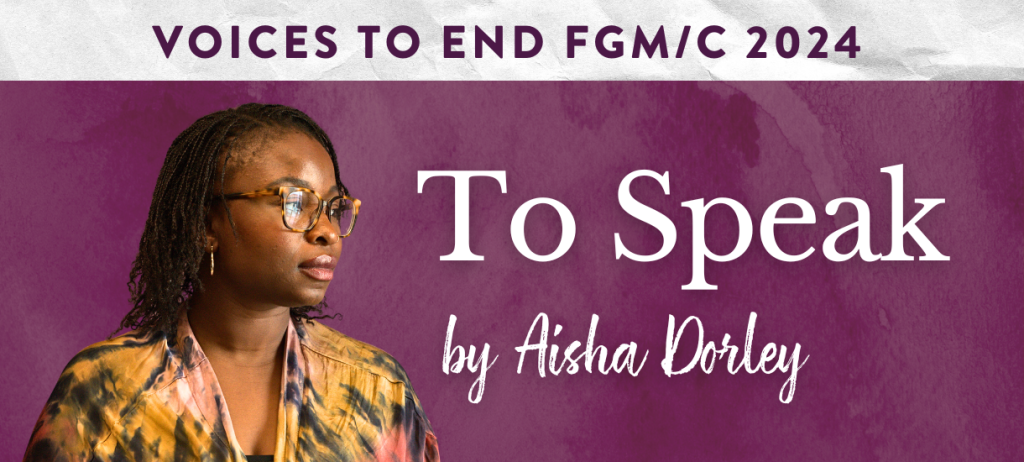
By Aisha Dorley I first came across the Voices to END FGM/C platform in the fall of 2022. The videos were so personal, vulnerable, and gripping. At the same time, they were educational in a way that no article or research paper could be. When I was presented with the opportunity to attend the workshop, I was a little hesitant at first because I was not a survivor of FGM/C. However, I later came to the realization that as an advocate from a practicing community, my voice could also make a difference in this movement. Although I have never undergone FGM/C, the issue has still affected my life.I chose to share the story that was most profound to me about my aunt, who went through FGM/C. I spoke about the emotional and psychological consequences she still endures after undergoing the cut nearly 40 years ago. I enjoyed meeting and getting to know the other participants in the workshop as well. The environment was so supportive and creative. Working with the other women put my mind at ease, and made me feel like I belonged in the space. I hope that my story can help others to find their voice and speak up. Especially those like me, who come from a practicing community and do not know how they can help or make a difference. I would like for my story to start the conversation within our families that can lead to incremental, but critical, change. [youtube url=”https://youtu.be/05dIG8n44ps”] Aisha Dorley is a public health professional with a passion for women’s health and well-being. She holds a masters in public health with a specialization in maternal child health. She channels her expertise towards ensuring the highest standards of care for women and children. Aisha’s career is fueled by a passion to advocate for health equity, striving to bridge gaps in healthcare access and outcomes. Beyond her professional endeavors, she actively engages in community outreach and education initiatives, aiming to empower individuals with knowledge for healthier lifestyles. Aisha Dorley exemplifies a steadfast commitment to improving public health through education, advocacy, and compassionate care.
On My Own Terms
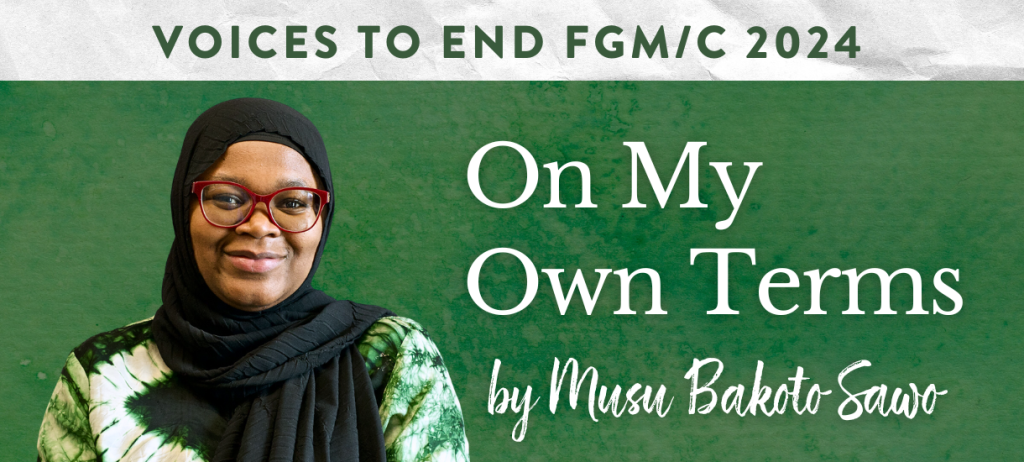
Why did you want to attend the workshop and share your story? I’ve had the opportunity to talk about my experience with female genital mutilation (FGM) and the ways in which it has impacted my life and my community. However, finding a platform that allows me to take ownership of my story—and have autonomy and control over the things that I share—is rare. So, when I heard about this opportunity, I thought it was amazing that there was a workshop where I could tell my story on my own terms. What story did you choose to tell and create into a digital story? My story was told in multiple parts. I talked about how FGM affects sexual intimacy; how it led me to become a child’s rights activist; and how it has shaped my work as a human rights advocate. My story also reflects how I see FGM as something that does not define me because there are so many other wonderful aspects of my life. I don’t like being called a victim because I’m not—I am a survivor, that’s how I define myself. I have gone on in life to achieve amazing things. I was part of the movement that led to the ban on FGM in The Gambia, and continue to be involved in protecting this ban. More recently, I have been involved in efforts to maintain the ban when it was threatened with repeal by Parliament. While this effort was successful, there is still more work to be done. We need to ensure the law remains in place to prevent a reoccurrence of the challenges we faced in the past several months. Additionally, we need to make sure that the law is fully implemented and enforced while continuously engaging with communities on the importance of sustaining the law. What have you learned or most enjoyed during the workshop and by meeting others who shared their stories? What I enjoyed the most about the workshop was the safe space created for us. This was particularly important to me because, although most of us were survivors of FGM, our experiences and stories were different. I was glad that we could all talk about our journeys on our own terms. I also appreciated the welcoming environment, which allowed everyone, including non-survivors, to share their voices. This openness, I believe, made it comfortable and safe for everyone to be vulnerable and share their thoughts and feelings. It’s like we created our own community as we held space for one another while bearing witness to each other’s stories as they were told. I also appreciated and valued the accommodations made to ensure that all participants had the best possible experience. It’s things like this that made the workshop a special and meaningful space to be a part of. What kind of impact would you like your story to have? I want people to start looking at survivors as people who have a voice—as people who have the right to share their stories and deserve to do so with dignity on their own terms. I also hope to inspire more people to get involved in the advocacy to end FGM. Through my story, I want people to understand the life-changing impact this practice has on women and girls. I want others to recognize the irreparable harm it causes in many different ways and understand why this practice must end. Is there anything in your digital story that you would like to share? I’d like to share this: if we don’t take an intersectional approach in addressing FGM, we risk perpetuating even more problems and causing significant harm. For example, if the ban against FGM in The Gambia can be threatened, so can other laws prohibiting gender and sexual violance, such as the anti-child marriage law. We need to ensure that when we talk about FGM, we frame it within the broader context of all other forms of gender-based violence and oppression because, in many ways, they are all interconnected. [youtube url=”https://youtu.be/uUb7zrdjwXE”] Musu Bakoto Sawo is a feminist human rights lawyer with over 18 years of experience in children’s and women’s rights advocacy and activism. She holds a Master of Laws in Human Rights and Democratization in Africa and a Master of Global Affairs in International Peace Studies and Gender Studies. With over 10 years of leadership experience in program and policy development, advocacy, and fundraising, Musu has made significant contributions to non-profit organizations as well as public institutions in The Gambia and across the African continent. Musu is also the recipient of numerous international and African human rights awards, including the 2018 Commonwealth Points of Light from Her Late Majesty Queen Elizabeth II; the 2020 Daily Trust African of the Year; and the Vera Chirwa Award from the Center for Human Rights at the University of Pretoria, South Africa. All these awards recognize her work for women and girls in The Gambia and beyond, particularly in relation to harmful traditional practices such as female genital mutilation (FGM). Her advocacy efforts contributed to the enactment of the legislation that banned both FGM and child marriage in The Gambia.
I Am SORRY!
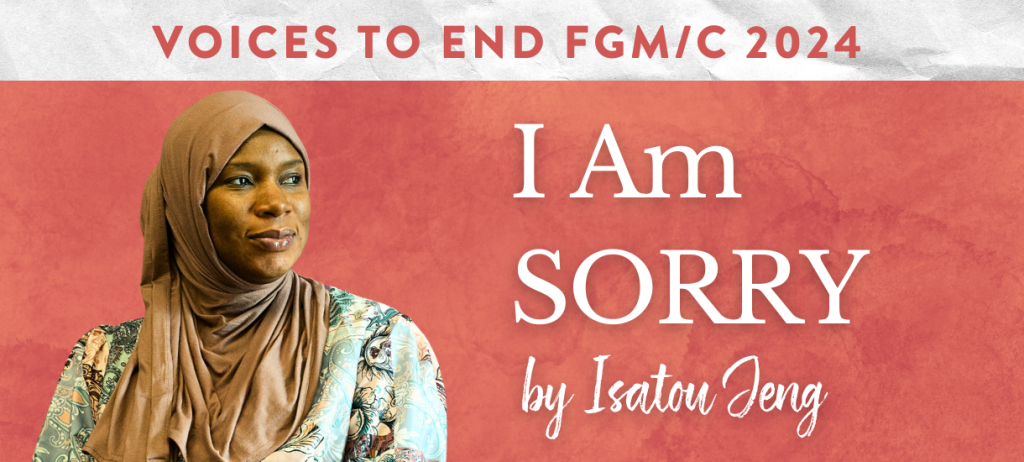
By Isatou Jeng For over a decade, I have used my voice and my story as a survivor of FGM/C to raise awareness around the issue. I started at a time when it was considered too “shameful” to share my personal experience as a survivor. I am glad that I shared my story regardless, though, as it emboldened many other survivors to share their stories and experiences publicly as well. Collectively, all of us survivors who spoke up ultimately led to a ban on FGM/C in The Gambia in 2015. I know the power of storytelling, which is also what attracted me to attend the 2024 Voices to End FGM/C workshop. This is the story I chose to share: Over the phone, one of my cousins informed me that they had cut my daughter and she added, “But she is doing fine, you don’t have to worry.” I couldn’t say a word as tears rolled down my face, knowing that I had failed my child. It took me over 15 years to share this part of my story with anyone – not even those closest to me knew about this part of my life. My daughter and I talked over it several times and I have asked for her forgiveness. She did forgive me, but it is I who is still unable to heal. For over a decade, I have helped save so many girls from FGM/C, but I was unable to protect my child. It hurts and I am not sure if I will ever heal from it. The workshop has been an incredible experience for me. I have shared my story over the years with others but not digitally. I was able to create and edit my story with the help of amazing facilitators who were always happy to provide support. It was also great to be in the same space with other storytellers who made it feel like we were a family. I felt safe and supported throughout the process and I am glad to be in the same community with champions who are all passionately working to end FGM/C. I want my story to reach all corners of the world and be a tool for change. I hope it serves as a call for other survivors to speak out and share their stories as we work together to end FGM/C and protect women and girls. I won’t ever get tired of apologizing to my daughter. I wish I was there to protect her. I wish she was never cut. It is heartbreaking knowing she is going to live the scar for the rest of her life. All I can say is “I am sorry!” [youtube url=”https://youtu.be/oi2OpeM1urU”] Isatou Jeng is a program management specialist with 13 years of experience and diverse skills in social justice, youth development, human rights advocacy, and campaigns in the non-profit sector. She has dedicated her life to ending all forms of gender-based violence and her work contributed to the criminalization of FGM/C in the Gambia in 2015. Now with The U.S. End FGM/C Network, Isatou is working with survivors, activists, and allies to end FGM/C in the US and globally.
My Journey to Advocacy
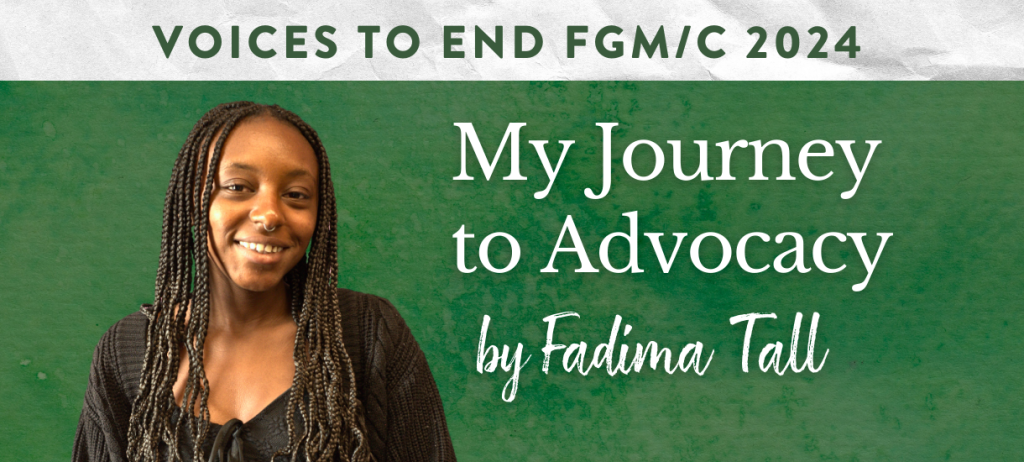
By Fadima Tall When I was invited to join the Sahiyo Voices to End FGM/C workshop, I was hesitant to accept. I had only been in the field of FGM/C advocacy for a few months and was still finding my footing as an advocate. I had always struggled with speaking about emotional topics, perhaps as a result of some deep-seated fear of opening up to people. More importantly, I didn’t know if I deserved to be included in a space that was for survivors of FGM/C, which I am not. I pondered deeply about what my role would be in the workshop and what I would have to offer the group, but I drew a blank. Though I knew that other advocates would also be there, there was still a part of me that still felt unworthy of participating in the workshop. Coming into the first virtual meeting I did not know what to expect from the group, but as we started to get to know each other I finally realized that I had nothing to worry about. Everyone was so welcoming and I saw myself reflected in every single person in that space. While I at first thought I was intruding on a safe space for women who have experienced something I haven’t, it turned out to be the community I never knew I needed. Over the next few weeks, my excitement about the in-person workshop continued to grow. After hearing these women bravely open up and tell us their stories of being cut, I gained the courage to travel with them on this storytelling journey as a supporter, advocate, and more importantly, as a friend. Because these women shared their stories with me, I learned so much about the practice that I hadn’t known, even as an advocate. Everyone’s story of FGM/C is different and every story can teach us something new about the pain that is caused by this practice. Through the workshop, not only did I learn about FGM/C but I also built amazing relationships with the workshop participants. These are friendships that I will cherish forever. I am endlessly inspired by the strength, kindness, and radiance I saw in all of these women and I am immensely grateful for the opportunity to have shared this experience with them. Though my story is not the same, I shared it in the hopes that other non-survivors could see what it looks like to become an advocate. It is not a linear journey and it looks different for everyone, but what we all share is a genuine love and care for the women and girls in our communities who are at risk or have experienced FGM/C. The story I shared for the workshop starts with me as a young girl beginning to understand that I live in a world that doesn’t value me for who I am, but instead for what I can offer the men around me. I shared moments in my life when I began to understand what FGM/C is and when I realized I needed to be an advocate against it. That story is only beginning, as I continue to grow every day as an advocate. I can only hope that my story has an impact on other aspiring advocates and shows people that anyone can do this important work and that everyone should. The Voices to End FGM/C workshop is an experience I am immeasurably grateful to have been a part of and I hope all of our stories shared there will inspire others to become advocates and encourage survivors to share their stories as well. [youtube url=”https://youtu.be/VqBHTpaB21Y”] Fadima Tall is originally from Cameroon and Mali but spent her formative years in Ethiopia. Currently serving as the Policy Research Associate at the US End FGM/C Network, she began her advocacy journey against FGM/C within the organization. Her deep interest in gender issues in Africa drives her pursuit of a PhD in International Relations at American University starting this Fall. Fadima is eagerly looking forward to participating in an upcoming workshop where she hopes to learn from FGM/C survivors and further develop her advocacy skills. She is also keen on improving her storytelling abilities through the workshop, recognizing its importance in amplifying voices and effecting change. Outside of her professional endeavors, Fadima finds creative fulfillment in art, particularly drawing and painting, which she enjoys in her free time.
Walking Together: My Experience at the Annual Walk to End Female Genital Mutilation in D.C.
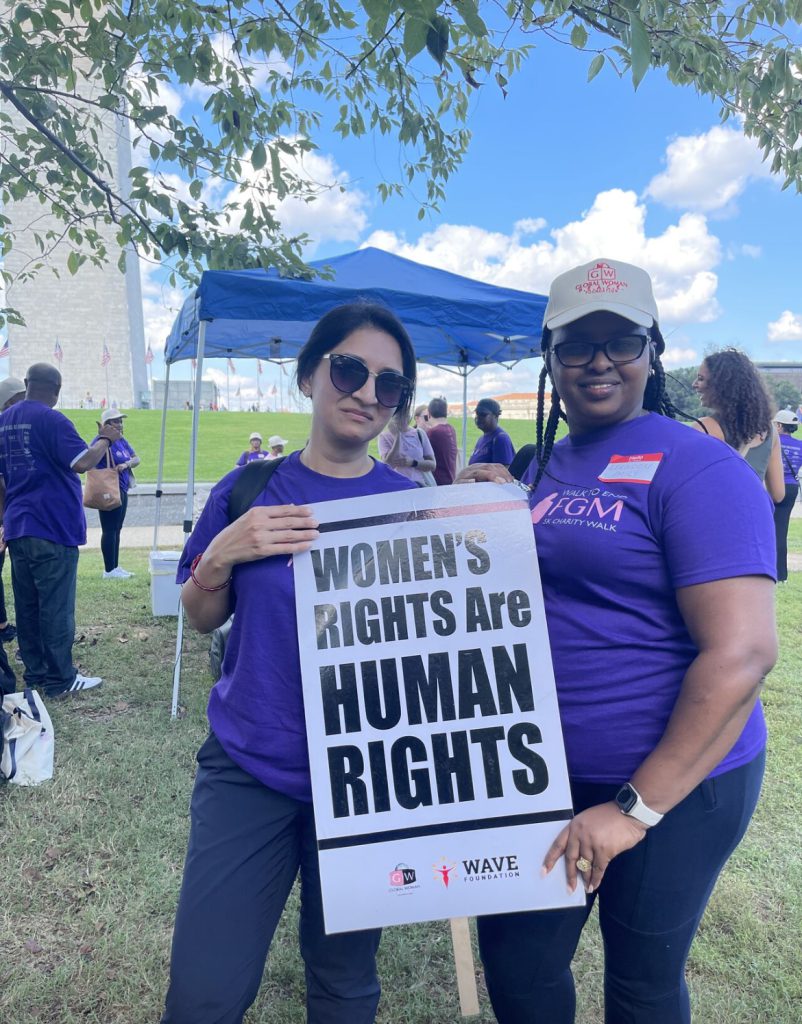
By Samman Masud This year, I had the wonderful opportunity to participate in the Annual Walk to End Female Genital Mutilation (FGM), held in Washington, D.C. on September 28th, 2024. The sense of community prior to the walk was palpable when I arrived at the amphitheater nestled across from the Washington Monument. I got a chance to meet many activists, survivors, advocates, and others that I work with in a virtual space, but haven’t met in person. Some participants traveled all the way from Seattle and California to walk with other community members, while others joined from the DC metro area and surrounding states. In it’s eleventh year, the Walk to End FGM welcomed participants from all walks of life. Men, women, the elderly, and even children joined their parents in uniting against a practice that affects millions of women and girls worldwide. The event piqued people’s curiosity, and many passersby stopped to ask questions about FGM/C and took interest in learning more about the prevalence of the practice in the U.S. and other parts of the world. Angela Peabody, Executive Director and cofounder of the Global Women Peace Foundation, welcomed all the participants to the event. It kicked off with the Global Woman Peace Awards ceremony, which honored activists and survivors who have made impactful contributions toward ending FGM/C. A beautiful musical performance, recognitions, and speeches followed the ceremony. I was honored to accept the Lisa C. Bruch Woman of the Year award on behalf of Amy Hill, who was being recognized for her service to survivors of FGM/C through the Voices to End FGM/C storytelling project, which she co-founded with Sahiyo’s Executive Director, Mariya Taher. I had the opportunity to work with Amy at a recent workshop in Washington D.C. in June 2024, so it was my great pleasure to receive the award and share remarks on her behalf since Amy was unable to attend the ceremony. “What started as a single digital storytelling workshop that we led together has become Voices to End FGM/C. To date, Voices has supported more than 75 survivors and advocates in connecting through the power of story and combining words and images into short videos that spotlight deeply personal and uniquely individual moments from their lives,” Amy said. The ceremony continued, with awards given to other activists, survivors, educators and ambassadors who discussed their commitment to advocate against FGM/C. It was especially heartwarming when some of the survivors and advocates proudly brought their young children with them on stage to accept the awards. I loved listening to these stories and seeing the pride they had in their work and achievements as FGM/C advocates. After the awards ceremony, we walked around the Washington Monument, chanting “No More FGM,” getting bystanders to join in on our calls for an end to this practice. The walk may have ended, but our work is far from over. I hope we can continue to mobilize communities throughout the U.S. and the international arena to highlight the urgency of ending FGM/C and push for policies that protect the rights and well-being of all women and girls.
Empowering Voices: The Launch of the Sharing Your Experience with Female Genital Mutilation/Cutting (FGM/C) Guide
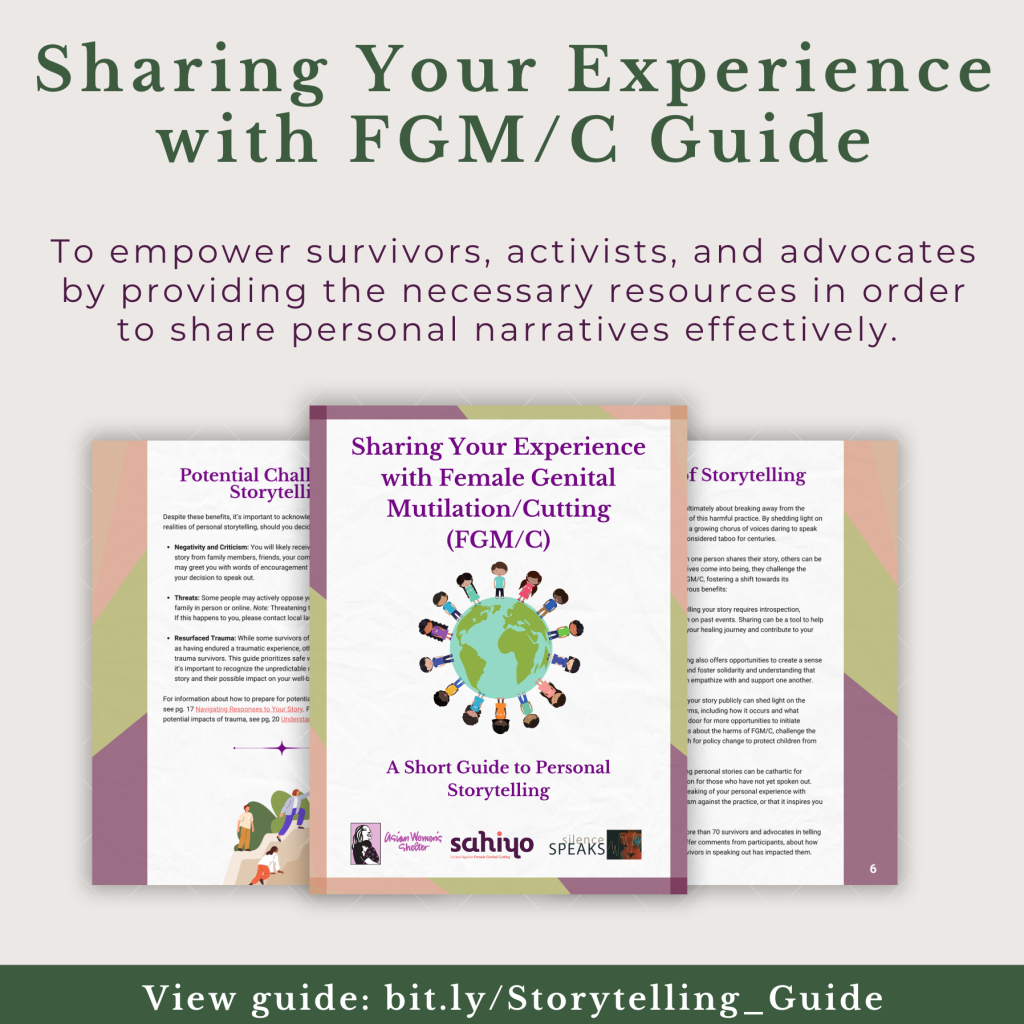
Sahiyo is excited to unveil our new guide, Sharing Your Experience with Female Genital Mutilation/Cutting (FGM/C), in partnership with the Voices to End FGM/C project. This project is a dynamic collaboration between Sahiyo U.S., Silence Speaks, and the Asian Women’s Shelter. This guide is designed to empower survivors, activists, and advocates by providing the necessary resources to learn how to share personal narratives publicly. This resource aims to amplify voices, educate communities, and, ultimately, mobilize individuals to take personal steps toward addressing female genital mutilation/cutting (FGM/C). What You’ll Find Inside: Writing Tips: Practical advice to help you craft and share your story in a way that feels right for you. Emotional Support: Insights on how to prepare yourself emotionally for the storytelling process. Public Sharing Guidance: Tips on how to share your story publicly, whether with friends, family, or a wider audience. Trauma Education: Information on the impacts of trauma and how to manage the feelings that might come up. We also encourage you to explore our Voices to End FGM/C website and discover the diverse stories from across the globe. Why This Guide Is Important Each story shared through this guide humanizes the issue of FGM/C, fostering empathy and inspiring action. For many survivors and advocates, sharing personal stories can be a powerful step towards healing and can also be a way for them to make a difference in their communities. Making space for people to tell their stories can help to transform feelings of helplessness into resilience and solidarity. By sharing our voices, we join in a brave community of survivors and advocates working to raise awareness and inspire change on this issue Ready to Share Your Story? If you’re ready to start sharing your experience with FGM/C, this guide is here to help. Your story is powerful and can make a significant impact in helping to raise awareness and support for ending FGM/C for future generations. Get the Guide You can access the guide today on the Voices website. You can also learn more about the Voices to End FGM/C program on Sahiyos website If you have any questions or need further support, please don’t hesitate to reach out to us. We’re here for you! Contact Us For any questions or more information on the Voices program, contact us at aries@sahiyo.org Your voice matters. Share your story and be part of the change.
Reflecting on Virtual and In-Person Sessions for Voices to End FGM/C Workshop 2024
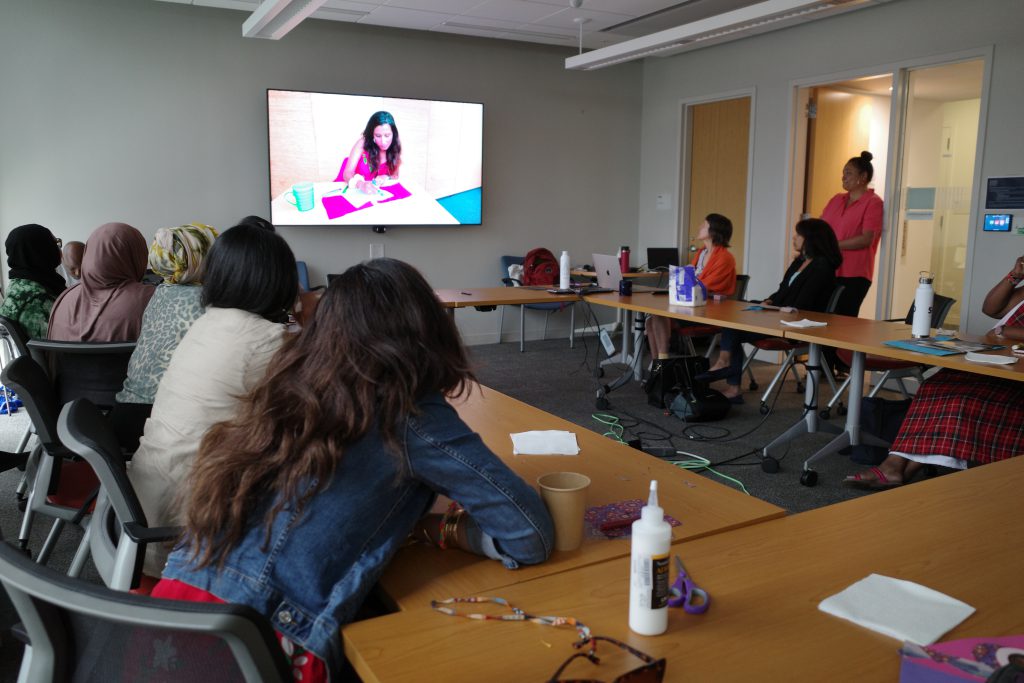
Sahiyo completed our 2024 Voices to End FGM/C digital storytelling workshop, welcoming 10 new storytellers to our ninth cohort. Since 2018, this initiative has united over 80 survivors, advocates, and community members in sessions designed to empower participants to share their personal stories and experiences with FGC. This year’s workshop was held in a hybrid format, starting with two virtual sessions on May 28 and June 4. These initial online gatherings allowed participants to introduce themselves, share their experiences, and begin forming deep, meaningful connections. The virtual sessions provided a safe and intimate space for storytelling, laying the groundwork for the in-person sessions that followed on June 22-23 at the George Washington University Milken School of Public Health in Washington, D.C. Once everyone gathered in person, the excitement was palpable as participants, who had bonded over their virtual interactions, finally met face-to-face. The atmosphere was like a reunion of old friends, filled with warmth and familiarity, as the intimate stories that had already been shared created strong bonds among them. During the in-person sessions, participants engaged in various activities designed to deepen their reflections and creative expressions as they recorded the audio and pieced together the visuals for their digital stories. A particularly touching moment was when a participant gifted beautiful scarves to the workshop facilitators, as a way to express her gratitude for the workshop and the supportive community it cultivated. She explained that this gesture is a custom in her community in Ethiopia, symbolizing appreciation and connection. To capture the inner workings and overall essence of the workshop, we invited a videographer and photographer to document the event on our last day together. They took photos and b-roll footage to create a behind-the-scenes video about the workshop. Facilitators and participants were interviewed about their roles and experiences, and storytellers shared their hopes and aspirations for their videos. These interviews provided deeper insights into the personal journeys, the impact of the workshop, and how the Voices to End FGM/C program has grown over the past few years. Both the virtual and in-person sessions were transformative, allowing participants to engage in a supportive space where interactions fostered a strong sense of community and solidarity. We are excited to share their stories with all of you in the coming months, showcasing the participants’ courage and commitment to ending FGC. To learn more about the Voices to END FGM/C program click here.
Exploring Diverse Narratives of FGM/C: A Virtual Voices Screening Event

Join us on June 26th for an engaging and interactive session that offers a unique opportunity for dialogue and reflection surrounding the diverse narratives of female genital mutilation/cutting (FGM/C). Through the powerful storytelling of our Voices to End FGM/C program, we will showcase a collection of authentic and compelling stories, each offering a glimpse into the lived experiences, resilience, and courage of individuals impacted by FGM/C. Webinar details: Date: Jun 26, 2024 Time: 9-10AM Pacific / 12-1PM Eastern Register: https://bit.ly/FGMCNarratives This session aims to foster understanding, empathy, and solidarity as we explore the multifaceted aspects of this issue. Together, let’s listen, learn, and engage in meaningful conversations about the impact of FGM/C on individuals and communities. We invite you to bring your curiosity and questions, as we strive to create a safe and open environment for dialogue and reflection. From the storytellers: “I was so shocked when I found out that it still happens in some communities around the globe, including the one my sister and I were raised in.” – Hatim (Listen) “As of 2020, estimates are that at least 200 million women and girls have experienced female genital mutilation. This statistic makes me question if I, a trans-non-binary survivor of FGM, am real.” – Dena (On Being A Non-Binary Survivor of FGM/C) “I will never forget, and even if my mind did forget, my body cannot.”– Somaya (Permanent Wound) Don’t miss this important event that brings to light the voices and stories of those who have been impacted by FGM/C. You participation contributes to a larger dialogue about human rights, gender equality, and the urgent need to end FGM/C. We look forward to seeing you there! Register today here.
Voices from Washington and Beyond: an In-Person Voices to End FGM/C Screening in Kent, WA
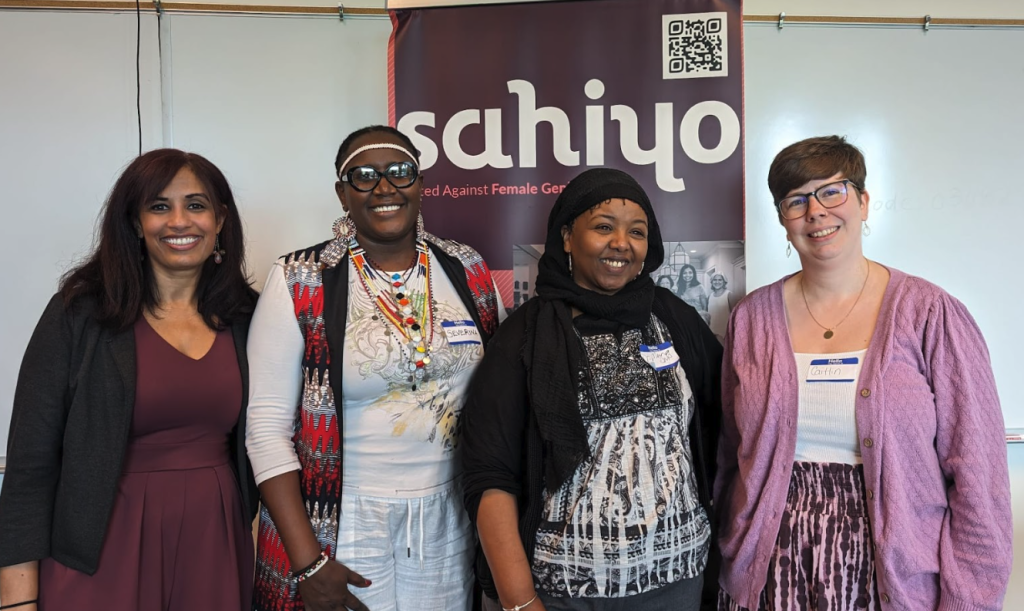
On June 13th, we had the privilege of hosting an in-person screening of the Voices to End FGM/C digital storytelling project in Kent, Washington, alongside project partners the US End FGM/C Network, Mother Africa, and the Washington Department of Health. This event provided a platform for courageous Washington-based individuals to share their personal narratives, shedding light on the practice of FGM/C and its profound impact on their lives. The screening featured powerful videos from participants who bravely addressed the physical, emotional, and social consequences of FGM/C. These stories highlighted the diverse and enduring impacts of the practice, reflecting a wide range of cultural and community contexts. Some storytellers shared their experiences of advocacy efforts to end FGM/C, while others explored how healthcare providers can best support survivors or discussed the effects of FGM/C on their family relationships. The event also emphasized the significance of Washington State’s recent legislative progress, particularly the passage of State Senate Bill 5453 in April 2023, aimed at addressing FGM/C within the state. This milestone underscores the importance of multi-sectorial, holistic approaches involving healthcare, government, nonprofit, and community-based organizations, alongside community members directly impacted by FGM/C. A special feature of the event was the panel discussion, where two of the storytellers, Muna and Severina, answered questions about their experiences and insights. The discussion covered topics such as the healing process, the need for support and resources, effective strategies for spreading awareness, challenges faced by survivors in seeking medical care, and ways to engage communities, including men and boys, in the conversation to end FGM/C. The screening in Kent fostered a sense of community and solidarity, highlighting the importance of creating safe spaces for open dialogue and mutual support. Many participants expressed gratitude for having a survivor-centered space where individuals could share and reflect on their experiences. We are deeply grateful to all the storytellers for their courage and the attendees for actively participating in learning more about FGM/C. Related: Sahiyo U.S. Engages Community Stakeholders in Seattle, Washington to Advance Senate Bill 5453 Initiatives Check out and bookmark Sahiyo’s Events Calendar
A Recap: Public Screening of the Voices 8th Cohort Digital Stories

On March 27th, we hosted a screening of nine digital stories as part of the 8th cohort of the Voices to End FGM/C program. This gathering showcased the powerful narratives of survivors, allies, and advocates committed to ending female genital mutilation/cutting (FGM/C). The discussion was moderated by Aries Nuño, Sahiyo’s Training and Technical Assistance Coordinator, Amy Hill from Silence Speaks, and Orchid Pusey from Asian Women’s Shelter, who are from partner organizations in this initiative. We were also joined by Jeniffer Dias and Gugu Makhari, participants from the latest workshop, who were invited to shed more light on their personal stories and continued efforts in addressing FGM/C. The event was well attended, with about 15 participants engaging deeply with the stories presented. Attendees expressed their appreciation for the storytelling, noting one story as “very powerful and engaging” and another as “beautifully tender and fierce.” The authenticity and bravery of the storytellers were frequently highlighted, with one story where it was described that “this practice did not make me a woman, I am doing that,” a quote that resonated strongly with the audience. With a few storytellers, whose home country is The Gambia, a conversation was sparked about the government’s current attempt to repeal the ban against FGM/C. Noting the importance that survivors should be driving the narrative given their personal experiences with FGM/C and motivating the changes seen in legislation. Feedback underscored the event as a warm and welcoming environment where personal and challenging topics could be shared safely. Many thanked the storytellers for their courage and for being “cycle-breakers,” changing the future for the next generation of girls. We are grateful for the continued engagement and support from our community, which fuels our mission to end FGM/C. We look forward to more such impactful events and thank everyone who shared their stories and those who came to listen. Applications are closing soon for our Voices to End FGM/C 2024 Workshop. To learn more about this opportunity, please visit our website and apply here! Deadline is April 15th.
